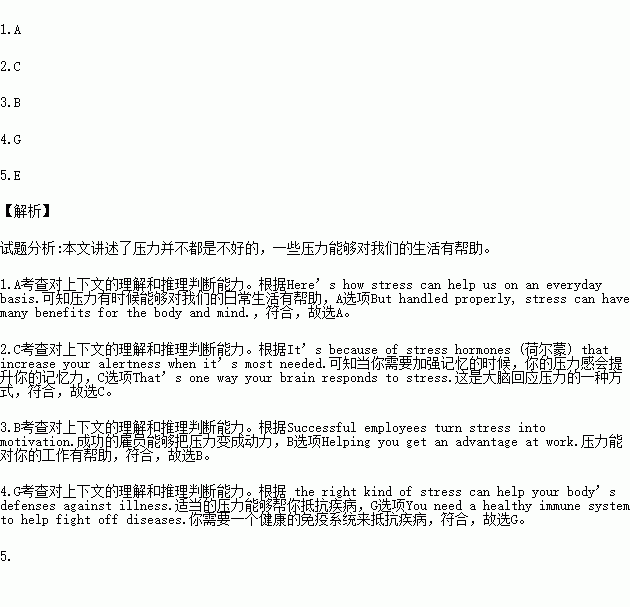题目内容
根据短文内容,从短文后的选项中选出能填入空白处的最佳选项.选项中有两项为多余选项。
We all face quantities of stress in day-to-day living, whether at work, in the home, or anywhere in between. 1. Here’s how stress can help us on an everyday basis.
◆Sharpening your memory.
Did you ever notice that sometimes when you are stressed, your memory seems to improve? Remember that test you passed where the answer seemed to come out of nowhere? 2. It’s because of stress hormones (荷尔蒙) that increase your alertness when it’s most needed.
◆ 3.
Successful employees turn stress into motivation. Have you ever noticed that you get the least amount of work done when you have fewest deadlines? Too little stress can affect how much you actually get done. When you take risks and choose to get over the difficulty, it improves your mental toughness and self-confidence.
◆Helping you resist the attack of illness.
4. Believe it or not, the right kind of stress can help your body’s defenses against illness. When you get sick, stress causes you to make hormones that battle threats to your health. That burst of stress is helpful to your immune system when your body faces a threat.
◆Making your life more interesting.
Think about some stressful situation that we consciously put ourselves in to make life more interesting and enjoyable, like asking someone out on a first date, conquering a known fear, or learning something new. These may not immediately come to mind when you think of stress because of the positive outcomes. 5.
A. But handled properly, stress can have many benefits for the body and mind.
B. Helping you get an advantage at work.
C. That’s one way your brain responds to stress.
D. This will happen whenever you are stressed.
E. But they’re the types that can help you achieve fulfillment and happiness.
F. Helping you get through difficult times.
G. You need a healthy immune system to help fight off diseases.
假设你是育才中学学生会主席李华。你校将举办一次英语演讲比赛 (speech contest).希望附近某大学的外籍教师Smith女士来做评委。请参照以下比赛通知给她写一封信。
英语演讲比赛 主题:人与自然 时间:6月15日下午2:00-5:00 地点:501教室 参赛选手:10名学生 联系人:李华(电话44876655) 欢迎大家光临 |
注意:词数100左右。
【写作指导】内容要点:一、自我介绍; 二、邀请做评委; 三、演讲主题;
四、 比赛时间; 五、参赛选手; 六、联系方式。
注:信中无需出现比赛地点,但写出亦不扣分。
Dear Ms. Smith,
_____________________________________________________________________________
_____________________________________________________________________________
_____________________________________________________________________________
With best wishes,
Li Hua


